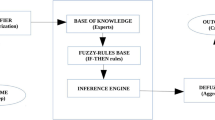Abstract
To over pass the limits inherent in liner models, suitable aggregation operators are required, taking into account interactions among the criteria. This becomes more and more crucial in Decision Theory, where all the information can be inferred by one or more Experts, using an ad hoc questionnaire. This is the case of the FEEM SI sustainability index, a composite geo-referenced index which aggregates several economic, social and environmental dimensions-structured in a decision tree- into a single number between zero (the worst sustainable country) and one (the best one). Fuzzy measure (non additive measures) are here proposed for the aggregation phase. To this purpose, each intermediate node of the structure combines the values of the sub-nodes using a model based on second-order non additive measure. To infer the value of the measure for each node, a suitable questionnaire has been fulfilled by a set of Experts, and the obtained answers were processed using an optimization algorithm. To guarantee the strict convexity of the algorithm, the questionnaire needs to be carefully designed. The individual measures are subsequently aggregated and the numerical results permitted to compare the sustainability of all the considered territorial units.
Access this chapter
Tax calculation will be finalised at checkout
Purchases are for personal use only
Preview
Unable to display preview. Download preview PDF.
Similar content being viewed by others
References
Athanasoglou, S., Weziak-Bialowolska, D., Saisana, M.: Environmental Performance Index, – JRC Analysis and Recommendations, EPI-JRC, pp. 1–33 (2014)
Beliakov, G.: Construction of aggregation functions from data using linear programming. Fuzzy Sets and Systems 160, 65–75 (2009)
Cardin, M., Giove, S.: Approximation of fuzzy measures using second order measures: Estimation of andness bounds. In: Masulli, F. (ed.) WILF 2013. LNCS (LNAI), vol. 8256, pp. 150–160. Springer, Heidelberg (2013)
Decanq, K., Lugo, M.A.: Weights in environmental indices of wellbeing: an overview. Econometric Review 32(1), 7–34 (2013)
Despic, O., Simonovic, S.P.: Aggregation operators for decision making in water resources. Fuzzy Sets and Systems 115(1), 11–33 (2000)
FEEM Sustainability Index Methodological Report 2011, Fondazione Eni Enrico Mattei (2011), http://www.feemsi.org/documents/
Jones, D., Mehrdad, T.: Practical Goal Programming, vol. 141. Springer (2010)
Ishii, K., Sugeno, M.: A model of human evaluation process using fuzzy measure. International Journal of Man-Machine Studies 67, 242–257 (1996)
Grabisch, M., Nguyen, H.T., Walker, E.A.: Fundamentals of uncertainty calculi with applications to fuzzy inference. Kluwer Academic, Dordrecht (1995)
Grabisch, M.: A new algorithm for identifying fuzzy measures and its application to pattern recognition. In: Proceedings of international 4th IEEE Conference on Fuzzy Systems, Yokohama, pp. 145–150 (1995)
Grabisch, M.: k-order additive discrete fuzzy measures and their representation. Fuzzy Sets and Systems 92, 167–189 (1997)
Grabisch, M., Roubens, M.: Application of the Choquet integral in multicriteria deci-sion making. In: Grabisch, M., Murofushi, T., Sugeno, M. (eds.) Fuzzy Measures and Integrals – Theory and Applications, pp. 348–374. Physica Verlag (2000)
Ishii, K., Sugeno, M.: A model of human evaluation process using fuzzy measure. International Journal of Man-Machine Studies 67
Kojadinovic, I.: Quadratic distances for capacity and bi-capacity approximation and identification. A Quarterly Journal of Operations Research (in press), doi: 10.1007/s10288-006-0014-4; Marichal, J.-L., Roubens, M.: Determination of weights of interacting criteria from a reference set. European Journal of Operational Research 124, 641–650 (2000)
Kojadinovic, I.: Minimum variance capacity identification. European Journal of Operational Research 177, 498–514 (2007)
Marichal, J.: An axiomatic approach of the discrete Choquet integral as a tool to aggregate interacting criteria. The IEEE Transactions on Fuzzy Systems 8(6), 800–807 (2000)
Marichal, J.-L.: Tolerant or intolerant character of interacting criteria in aggregation by the Choquet integral. European Journal of Operational Research 155, 771–791 (2004)
Marichal, J.-L.: K-intolerant capacities and Choquet integrals. European Journal of Operational Research 177, 1453–1468 (2007)
Meyer, P., Roubens, M.: Choice, ranking and sorting in fuzzy Multiple Criteria Decision Aid. In: Figueira, J., Greco, S., Ehrgott, M. (eds.) Multiple Criteria Decision Analysis: State of the Art Surveys, pp. 471–506. Springer, New York (2005)
Miranda, P., Grabisch, M.: Optimization issues for fuzzy measures. International Journal of Uncertainty, Fuzziness and Knowledge-Based Systems 7(6), 545–560 (1999)
Mori, T., Murofushi, T.: An analysis of evaluation model using fuzzy measure and the Choquet integral. In: Proceedings of 5th Fuzzy System Symposium, Kobe, Japan, pp. 207–212 (1989) (in Japanese)
Murofushi, T.: A technique for reading fuzzy measures (I): the Shapley value with respect to a fuzzy measure. In: 2nd Fuzzy Workshop, Nagaoka, pp. 39–48 (1992) (in Japanese)
OECD/EC JRC, Handbook on Constructing Composite Indicators: Methodology and User Guide. OECD, Paris (2008)
Pinar, M., Cruciani, C., Giove, S., Sostero, M.: Constructing the FEEM sustainability index: A Choquet integral application. Ecological Indicator 39, 189–202 (2014)
Shapley, L.S.: A value for n-person games. In: Kuhn, H.W., Tucker, A.W. (eds.) Contributions to the Theory of Games, Vol. II. Annals of Mathematics Studies, vol. 28, pp. 307–317. Princeton University Press, Princeton (1953)
Author information
Authors and Affiliations
Corresponding author
Editor information
Editors and Affiliations
Rights and permissions
Copyright information
© 2015 Springer International Publishing Switzerland
About this chapter
Cite this chapter
Farnia, L., Giove, S. (2015). Fuzzy Measures and Experts’ Opinion Elicitation. In: Bassis, S., Esposito, A., Morabito, F. (eds) Advances in Neural Networks: Computational and Theoretical Issues. Smart Innovation, Systems and Technologies, vol 37. Springer, Cham. https://doi.org/10.1007/978-3-319-18164-6_22
Download citation
DOI: https://doi.org/10.1007/978-3-319-18164-6_22
Publisher Name: Springer, Cham
Print ISBN: 978-3-319-18163-9
Online ISBN: 978-3-319-18164-6
eBook Packages: EngineeringEngineering (R0)




